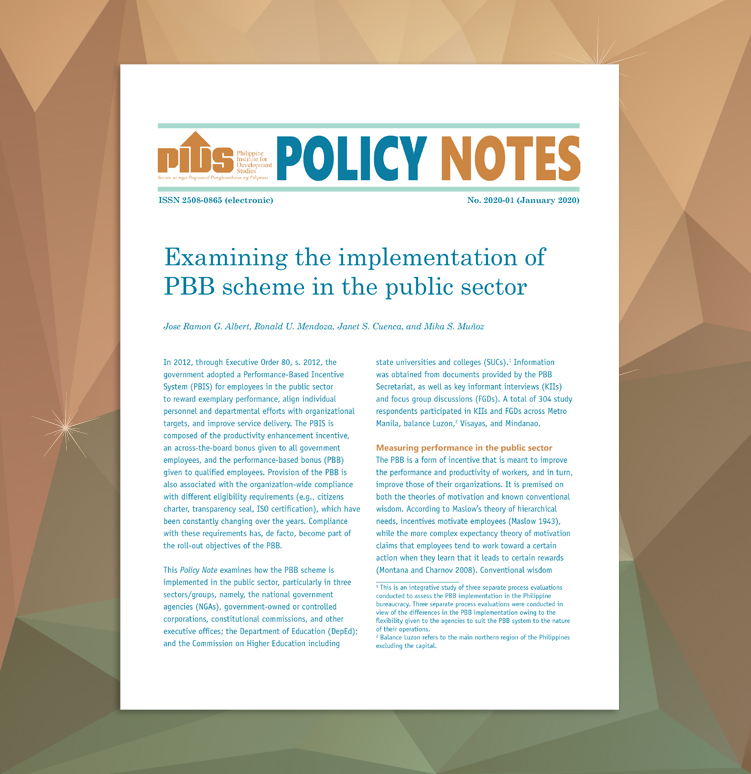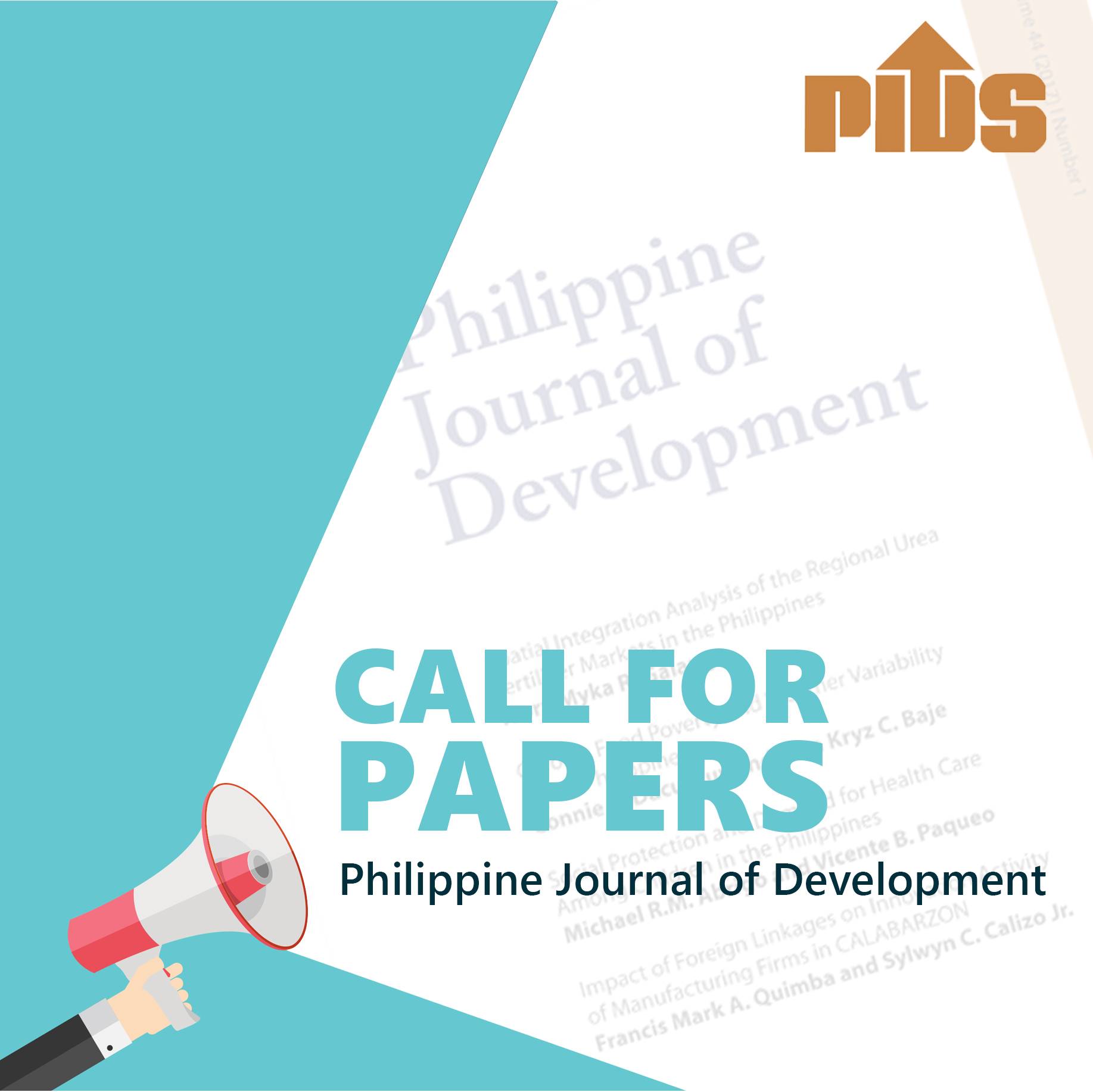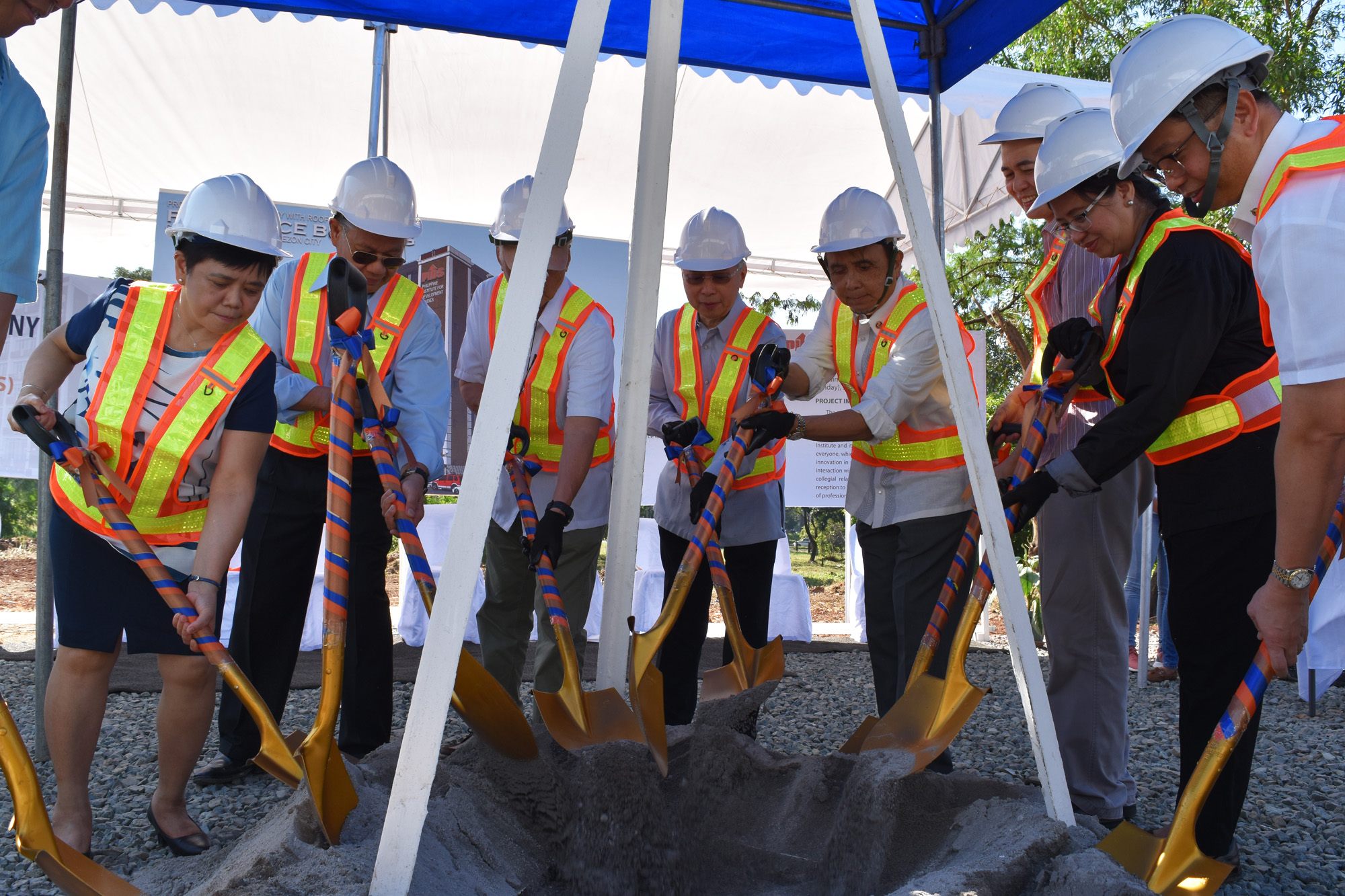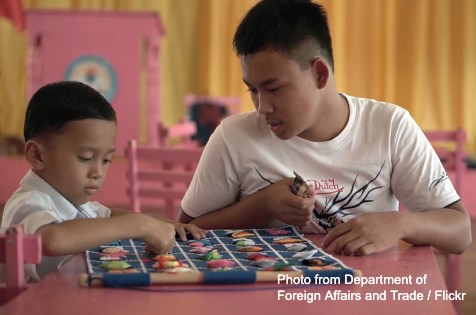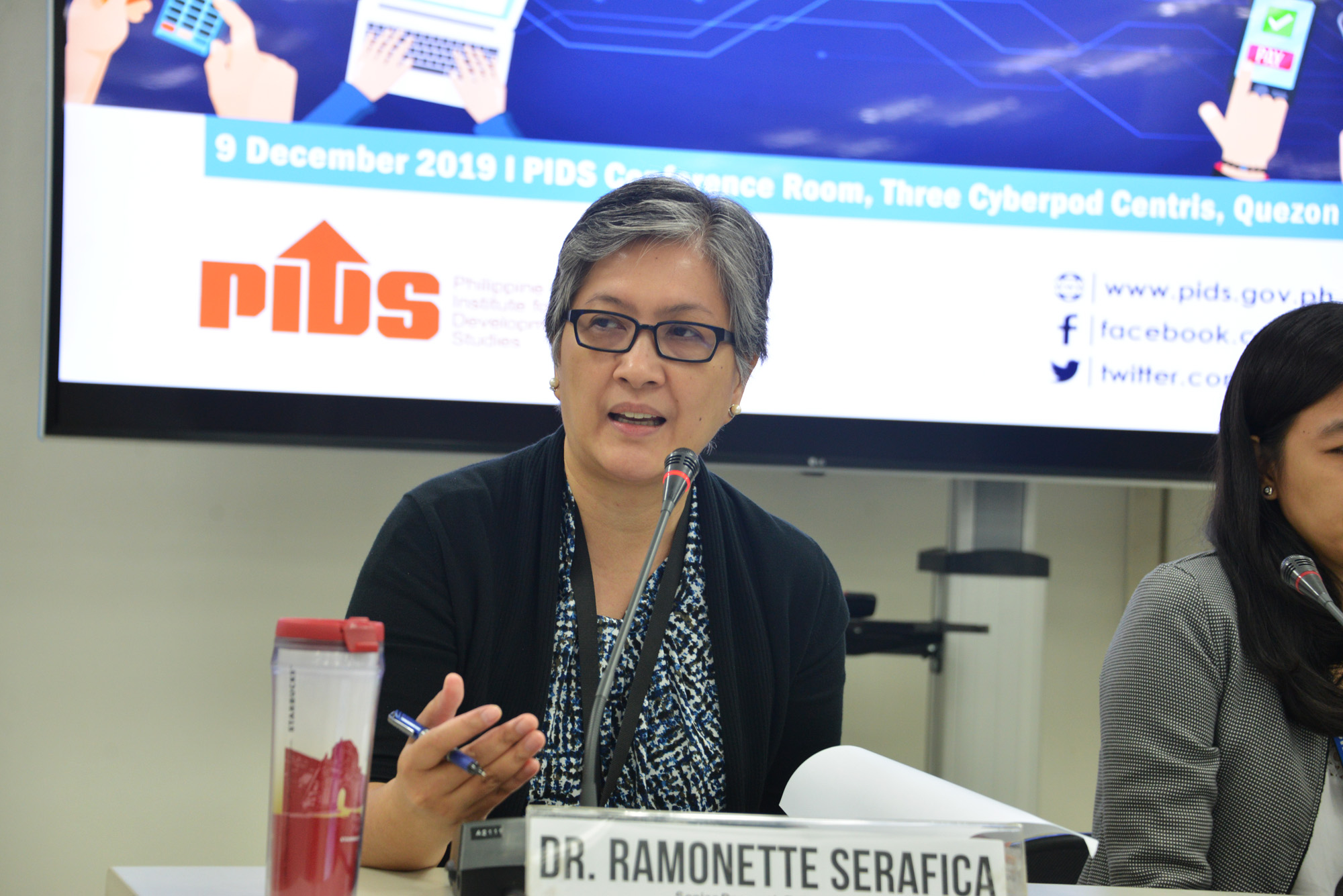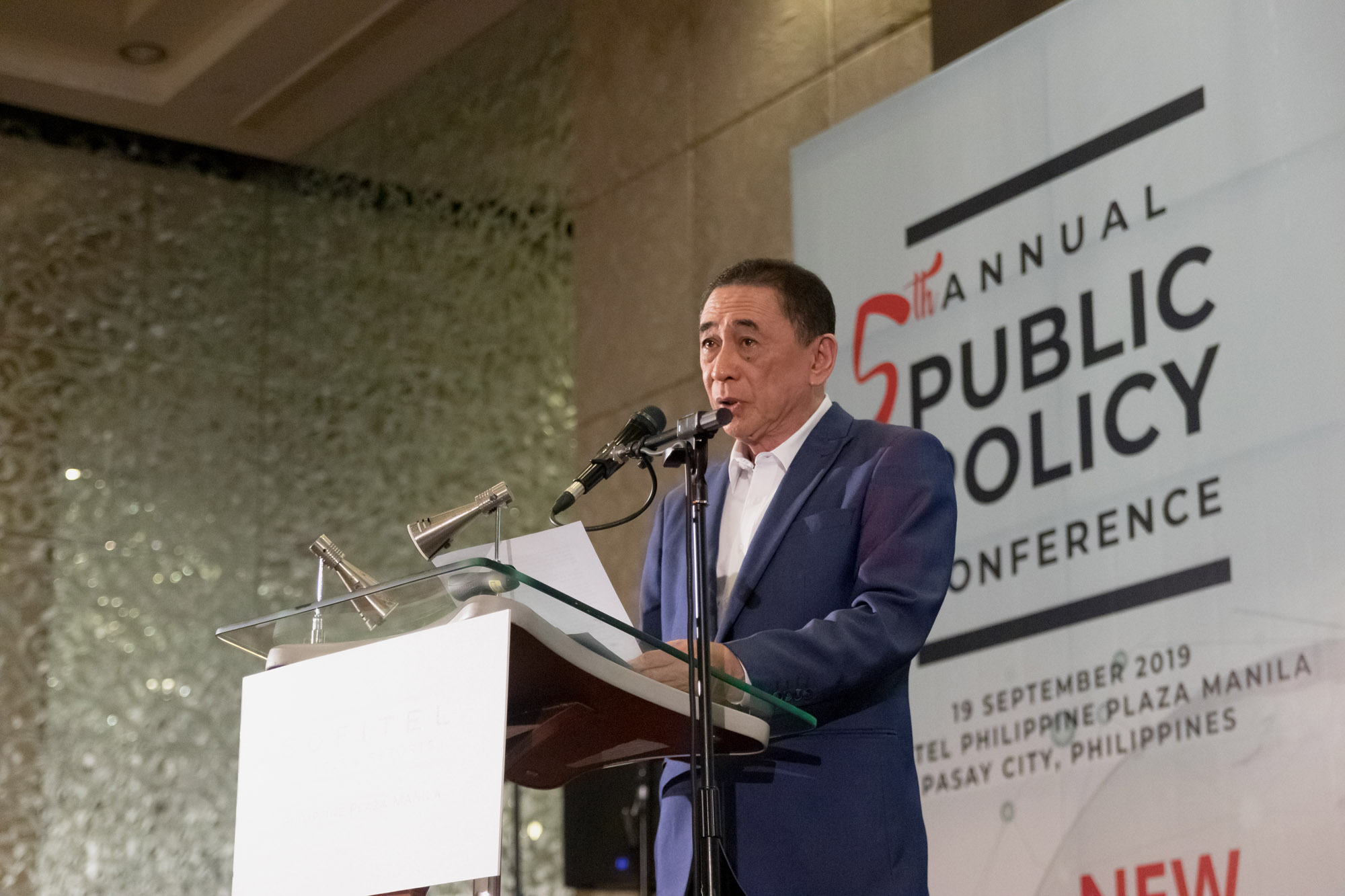Having trouble reading this email? View it in your browser. |
||||
 |
||||
|
||||
POLICY NOTES
In 2012, the government adopted a Performance-Based Incentive System, composed of the productivity enhancement incentive and the performance-based bonus (PBB), to reward exemplary performance of employees in the public sector. This Policy Note examines how the PBB scheme is implemented in three sectors of public service. The study finds, among others, that while there was a general strong support for its continuation, many lamented on the increasing number of PBB requirements over time. In the education sector, there was no proper dissemination of information on the PBB scheme at the school level. However, the study finds that the PBB scheme strengthened team work among employees. Government personnel became more aware of their responsibilities and deadlines and exercised more accountability for each other. It also noted unintended consequences of the incentive program, such as jealousy among employees, perception of arbitrary ratings, increased tendency to render overtime, and unnecessary competition among staff. To enhance the effectiveness of the PBB scheme, the study suggests for the government to institute changes in the PBB requirements less frequently and only after ample preparation for cascading information. It is also critical that reform and capacity-building roadmaps in each agency be synched with the PBB targets. Click here to download the policy note.
PN 2019-14: Issues and Concerns in the Implementation
of PBB at DepEd The Department of Education (DepEd) is the biggest agency in the Philippine bureaucracy to implement the performance-based bonus (PBB) scheme. This Policy Note revisits the PBB program implementation through a process evaluation. It finds, among others, that PBB had a positive effect on quantitative performance measures but not on qualitative performance measures. Moreover, some key performance indicators, such as achievement test scores and dropout rates, were misreported. With these problems, the study urges the DepEd to exact greater accountability from the teachers who are directly interacting with the students and to develop a mechanism to address problems on low or unacceptable teacher performance. It also calls for the strengthening of the grievance process, whereby legitimate grievances related to the PBB are addressed early on at the school level without having the need to elevate them to the higher level. Further, it recommends assigning a school-level focal person to improve dissemination of the PBB guidelines to teachers and facilitate coordination of activities related to PBB implementation and compliance. Click here to download the policy note. PN 2019-13: Challenges in the Implementation of the PBB Scheme in NGAs The Philippine government has adopted a performance-based incentive system (PBIS) for employees in the executive department to motivate higher performance and greater accountability in the public sector. It is composed of the performance-based bonus (PBB), a top-up-based bonus premised on the delivery of units or individual contributions to the accomplishment of agency targets, and the productivity enhancement incentive, an across-the-board bonus amounting to PHP 5,000 per employee. This Policy Note zeroes in on the PBB and its implementation in national government agencies (NGAs) and attached agencies, government-owned or -controlled corporations, constitutional commissions, and other executive offices. It finds that the compliance of agencies to varying PBB requirements has become more tedious over time, to the extent that meeting such demands tends to jeopardize their major functions. The best-better-good-poor rankings have also been perceived as unfair, resulting in undue competition within the agency. The study urges the government to minimize frequency of changes of PBB requirements. With the perceived lack of fairness and the resulting undue competition among employees, the PBB design and rating system for individuals should be revisited, particularly the conflict between individual and institutional performance. Click here to download the policy note.
DISCUSSION PAPERS DP 2019-38: Towards a More Inclusive Agricultural Insurance Program Typhoons, pests, and other natural calamities cause the country, particularly the agricultural sector, significant damages. For instance, Typhoons Yolanda (Haiyan) and Ompong (Mangkhut) have caused PHP 35 billion and PHP 27 billion worth of agricultural damages, respectively, based on estimates by the Department of Agriculture. Given that a third of the country's workforce depend on the agriculture sector, it is crucial that efforts are undertaken towards mitigation of the effects of these shocks and risks. One of these efforts is agricultural insurance provided by the Philippine Crop Insurance Corporation (PCIC). Using information from the PCIC, key informant interviews and focus group discussions with agricultural producers, and findings from earlier studies on agricultural insurance, this study examines the constraints in, opportunities, and efforts for achieving impact and inclusion of agricultural insurance programs in the Philippines. Click here to download the paper. DP 2019-37: Expanding Health Insurance for the Elderly of the Philippines This paper evaluates a Filipino policy that expanded health insurance coverage of its senior citizens, aged 60 and older, in 2014. Using regression discontinuity and difference-in-differences methods, the study finds that the expansion increases insurance coverage by approximately 16-percentage points. Compliers induced by the policy to obtain insurance are disproportionately female and largely from the middle of the socioeconomic distribution. Instrumental variables estimates indicate that out-of-pocket medical expenditures more than double among the compliers. The study also argues that this is most likely driven by an outward shift in the medical demand curve. Click here to download the paper. DP 2019-36: Process Evaluation of the Universal Access to Quality Tertiary Education Act (RA 10931): This study is an early assessment of the Universal Access to Quality Tertiary Education Act (UAQTE) or Republic Act 10931, also known as Free Tuition Law, which mandates all public higher education institutions (HEIs) and government-run technical-vocational institutions (TVIs) to provide free quality tertiary education among eligible Filipino students. Given the limited time and resources, the study concentrated on the implementation of the higher education component and was not able to cover the implementation component on TESDA TVIs. Examining the first-year enrollment data, one noteworthy observation is that public HEIs were able to recover from declines in enrollment due to the introduction of Grades 11 and 12 better than private HEIs in Academic Year 2018–2019. This is true at least among the universities included in the sample of the study. There are also indications of a widening gap in the share of public and private HEI enrollment, also among first year students. Duly recognizing that the law is still in the transition period of implementation, the study raises concerns that emerged from the interviews and quantitative information and presents recommendations to strengthen the law's implementation and enhance the chances of achieving its desired outcomes. Click here to download the paper. |
February 13, 2020, 1–5PM
The Philippine Journal of Development is a professional journal published by the Philippine Institute for Development Studies. It accepts papers that examine key issues in development and have strong relevance to policy development. As a multidisciplinary social science journal, it accepts papers in the fields of economics, political science, public administration, sociology, and other related disciplines. It considers papers that have strong policy implications on national or international concerns, particularly development issues in the Asia-Pacific region. CLICK HERE for the guidelines in the preparation of articles. Submissions and inquiries may be sent to PJD@mail.pids.gov.ph. |
|||
The Philippine Institute for Development Studies (PIDS) will soon have its own building in Quezon City.
A study of state think tank Philippine Institute for Development Studies (PIDS) identified the lack of transportation, basic facilities, and infrastructures as major challenges in providing education to children with disabilities. The authors of the study—Adrian Agbon and Christian Mina—recommended the provision of mobile special education (SPED) schools especially in far-flung areas. They also urged the government to initiate more activities and programs that will increase awareness about pupils/students with special needs, enhance the Alternative Learning System (ALS) or mobile teacher program of the Department of Education (DepEd), and put up more SPED facilities that cater to all types of disabilities by tapping local government units (LGUs) in providing regular venues for ALS classes. READ MORE
The online or platform economy faces a number of challenges as it continues to reshape the way people do business.
The government should focus on promoting the creative industries, an emerging sector that could potentially contribute to the country’s economic growth. According to the United Nations Conference on Trade and Development, creative industries include advertising, architecture, arts and crafts, design, fashion, film, video, photography, music, READ MORE
Small and medium enterprises (SMEs) in the Philippines need to undergo digital transformation to harness the benefits of technological developments under the New Globalization.
Labor market education is important to future-proof the next generation of Filipino workers. | ||||
FACT FRIDAY
|
||||
Need help? Have feedback? Feel free to contact us. © 2018 Philippine Institute for Development Studies.
|
||||
